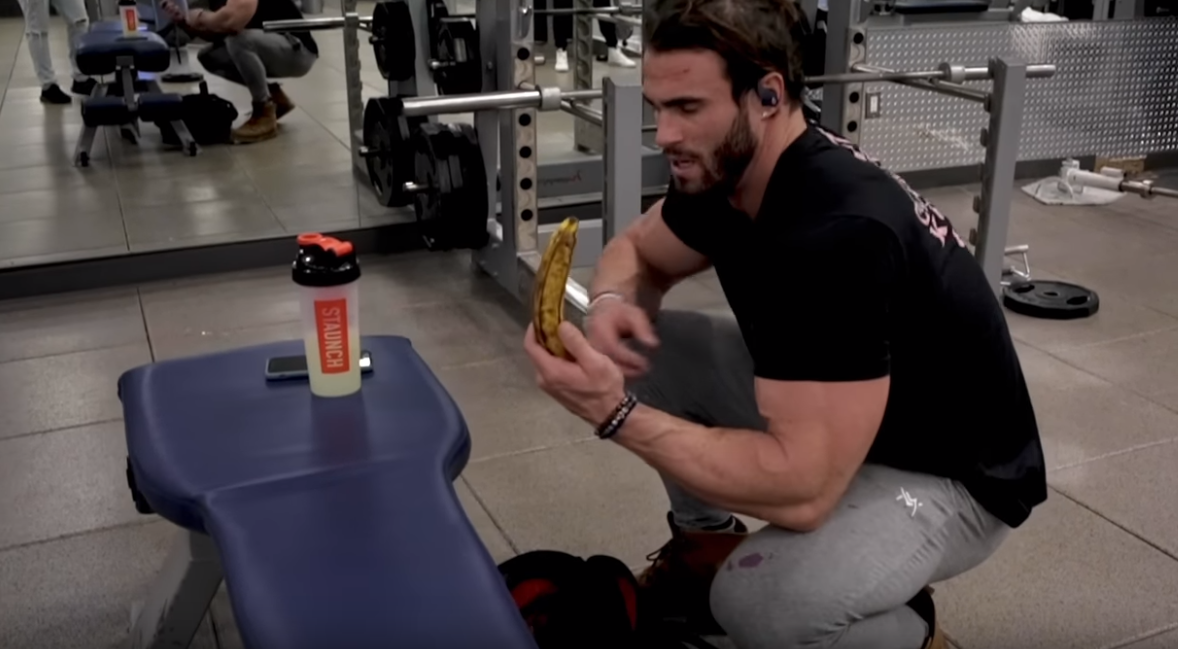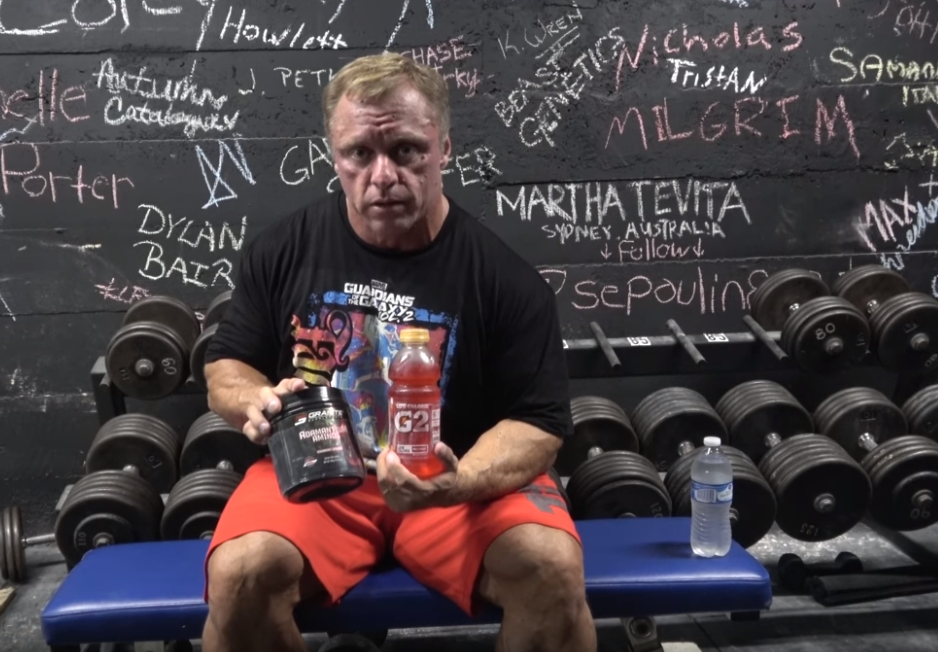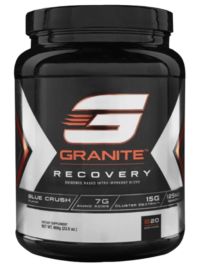We all know that what and how much we eat is of utmost importance for our fitness results. That’s a given.
But what about when we eat? Especially if our goals are to maximize our muscle gains and fat loss?
In recent years, intra-workout nutrition has become a popular topic, and more and more people are jumping at the idea.
These days, we have so much information regarding workout nutrition that it can be incredibly frustrating to pick it all apart and find the useful bits.
To that end, we’ve put together this handy guide for you. Below, you’ll learn everything there is to know about intra-workout nutrition – what it is, what benefits it offers, and how to do it in the most optimal way possible.
Let’s jump right in.
Here is Calum Von Moger taking intra workout to a whole nother level.
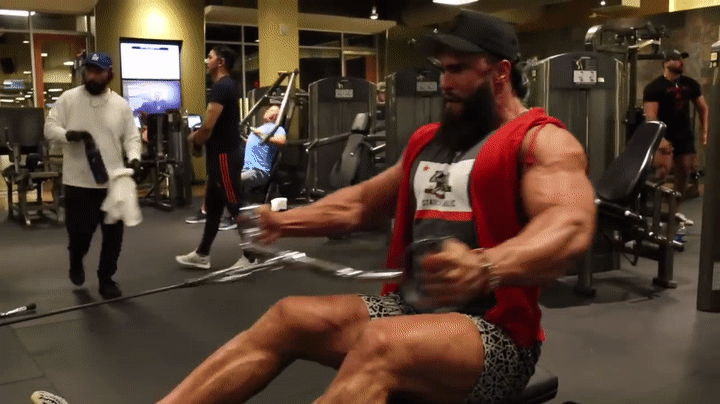
What Is An “Intra-Workout” Anyway And What’s The Logic There?
You’ve probably come across the term with regards to supplements – intra-workout carbs, BCAAs, etc.
It simply refers to your nutrition during a workout, as opposed to your pre- (before) and post- (after) training meals.
The logic behind intra-workout nutrition is simple:
Training is an inherently catabolic process (meaning, it causes stress and breakdown of tissue), and we must actively counter it with the help of nutrients. Supposedly, doing so during exercise is the best way because your body receives an adequate dose of calories and nutrients right when it needs them. That way, we prevent the breakdown of muscle tissue and allow the body to repair itself and grow much more efficiently (anabolism).
That, at least, is the theory on paper. But how does it hold up in the real world?
Intra-Workout Carbs, Proteins, and Fats – Do We Need Them?
Before answering this question, let’s take a quick look at what intra-workout nutrition should achieve:
- Provide you with immediate fuel for the demanding physical tasks;
- Improve your athletic performance;
- Decrease your subjective feeling of fatigue;
- Keep you well-hydrated;
- Prevent excessive breakdown of muscle tissue;
- Accelerate the process of recovery;
Okay, this is a bit of a long list, I’ll admit, but it’s not as complicated as it may seem. Let’s review.
Carbs during exercise.
First off, the idea that we need carbs only if our training session passes the two-hour mark (think endurance training) is incorrect. The fact is, even shorter and more intense training sessions can deplete a large percentage of our glycogen stores (1, 2). While it is still speculative, some researchers suggest that having more glycogen serves as anabolic signaling to the brain, which indicates that we are well-fed. Researchers also speculate that this particular signal is vital for muscle retention and better growth over time (3).
On that same note, having more carbs in your system will ensure that you better maintain your performance as the workout progresses (4). Better performance means higher training volume (more sets, more reps, and heavier weight), which would create a stronger growth-stimulus and lead to better results over time (5).
So, unless you’re planning to do a super short and non-challenging workout (similar to the ones you would do during a deload week in the gym), having some carbs in your system is an excellent way of ensuring good performance.
Second, carbohydrates stimulate the release of insulin – a hormone that has been shown to help increase muscle protein synthesis (6, 7).
Higher muscle protein synthesis directly translates to better gains.
So, we’ve got two solid reasons why intra-workout carbs can be quite beneficial for us. Sure, that might not make much of a difference in a week or a month. But those small improvements can lead to tremendous benefits over time.
Here is Wesley Vissers from Vintage Genetics enjoying some intra workout nutrition.
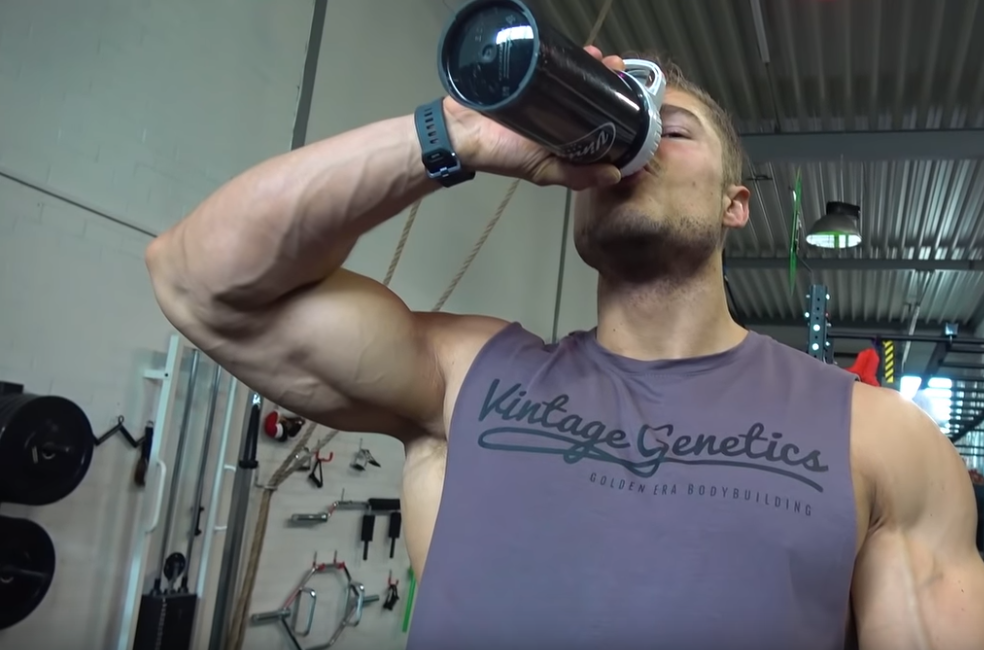
Protein during exercise.
Prevailing wisdom suggests that we need protein at all hours of the day if we want to keep the anabolic flame strong and our gains plentiful. But how true is that?
Well, it’s been well-established that protein is vital for muscle growth (8). The nutrient also seems to play an essential role in reducing markers of muscle damage, which means that we take less time to recover from our training and we get to enjoy better gains in the long run (9).
Protein also provides an avalanche of amino acids for the body, which it can use when needed – not just for the particular moment, but for hours after we’ve last eaten (10).
According to Brad Schoenfeld Ph.D. and colleagues, we don’t need to ingest protein during exercise, so long as we (11):
- Eat within a few hours before training.
- Consume some protein after training (preferably, sooner, especially if our last meals was over six hours ago).
- Spread our total protein intake across three or four meals with at least a couple of hours in-between.
Now, if you can’t seem to cover these three basic rules of optimal protein intake (especially the pre and post-training meals), it might be a good idea to get some amino acids in your bloodstream during exercise. We’ll go over some recommendations below, so keep reading.
Fats during exercise.
Contrary to popular belief, fats are not harmful to us, so long as we get the majority of them from healthy foods and have some caloric mindfulness (i.e., avoid overeating too much). In fact, fats are vital for hormonal function, cell creation, healthy metabolism, the absorption of certain nutrients, and much more (12).
But, the question is, are the effects of dietary fat acute, and do we need to consume them around our workouts to maximize their benefits? The answer is no.
So long as you consume enough fats every day, timing them doesn’t appear to make a difference. In the short term, fats don’t seem to impact athletic performance, motivation, or cognitive function. If anything, fats tend to take longer to break down, which can cause stomach bloating during exercise.
So, it’s enough to get enough fats every day (between 0.3 and 0.6 grams per pound of body weight), and ensure that most of them come from healthy sources (e.g., avocado rather than pizza) (13).
Are Intra-Workout Supplements Necessary?
These days, it feels like supplement companies offer products for every imaginable situation in our lives.
Are you feeling stressed? Take our supplement. Are you having a workout? Mix this powder with water and drink it. Pre-workout meal? Nah, take our product. Post-workout meal? Ah, you guessed it – we’ve got you covered. Breakfast? Yep, same. Dinner? Absolutely.
But do we need intra-workout supplements?
Well, let’s take a look at the facts. In the previous section, we established that:
- Intra-workout carbs can be beneficial on multiple fronts (glycogen repletion, an immediate source of energy, anabolic signaling, and an increase in insulin which may help with muscle protein synthesis).
- Intra-workout protein is not necessary to have during a workout, so long as 1) your workouts aren’t much longer than an hour, 2) you consume some protein in the hours before a workout, 3) you get some protein in your system after training, 4) you get enough protein for the day, 5) and you spread that protein intake between three or four meals (11).
- Intra-workout fats are not needed, and we shouldn’t expect any benefit from having them (13).
That covers the three macronutrients. But there’s one thing worth considering here: electrolytes.
Electrolytes is an umbrella term that covers several essential minerals: namely potassium, sodium, chloride, calcium, magnesium, and phosphate. As their name suggests, electrolytes are electrically-charged molecules that release a positive or negative charge when they dissolve in fluid. These charges play essential roles in processes like muscle contractions, brain function, nerve signaling, and more (14).
Having too little of these minerals within the body can cause fatigue, brain fog, and numerous health issues (15). That’s important to keep in mind because, as we exercise and sweat, we tend to lose electrolytes, which can negatively impact our performance and motivation. This is particularly important if your workouts tend to be longer.
With that said, do we need intra-workout supplements?
For the majority of people, I’d say no. As we covered already, so long as you follow a healthy eating pattern and get a balanced ratio of proteins, fats, and carbs every day, stressing over intra-workout nutrient intake probably won’t make that big of a difference. In other words, 90 to 95 percent of your results will come from following a solid eating plan. The remaining five to ten percent might potentially come from considering such details.
If, for whatever reason, you’re not able to eat as you usually do, and find yourself training on an empty stomach, then yes, having something like a carb and electrolyte gel in the middle of your workout can be beneficial.
Similarly, if your workouts tend to take much longer than an hour (for example, you can’t train as often, so you cram more volume in each session), replenishing some of the lost carbs is a great way to maintain performance (4).
On That Same Note: Do We Need Intra-Workout BCAAs?
Branched-chain amino acids (BCAAs) have become incredibly popular in recent years, and supplement manufacturers claim that we must have them during and after training if we want to maximize our muscle growth.
But, research doesn’t seem to agree with that (16). Again, so long as you abide by the above rules for protein intake, BCAAs likely won’t contribute to your gains. The only two scenarios where they might be beneficial are:
1) If you train fasted in the morning – having some BCAAs during or right after your workout is a great way to prevent catabolism (17).
2) If you haven’t had any protein within four to six hours before training and might not be able to eat right afterward, having some intra-workout BCAAs can be helpful.
Here is Calum Von Moger again. He is notorious for eating during training.
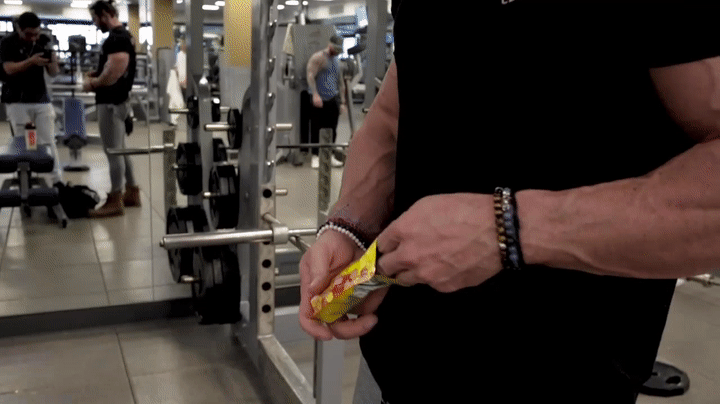
What Ingredients Do We Typically Find in Intra-Workout Supplements?
Granted, many products out there are sold as intra-workout supplements, and covering all of them here would be impossible. With that said, here are the eight most common ingredients we can typically find in intra-workout supplements:
1) BCAAs
Most intra-workout supplements out there contain at least some amount of the three branched-chain amino acids – leucine, isoleucine, and valine. As we discussed above, BCAAs can provide a quick and convenient source of amino acids (primarily leucine), which can help improve muscle repair and growth (17).
No matter what goals you may have with fitness, preserving the muscle tissue you have should be of utmost importance.
2) Taurine
Taurine is an amino acid that has been shown to increase energy levels and fight off certain diseases (namely, diabetes and heart disease) (18) So, naturally, manufacturers often include the amino acid in their products.
It’s worth noting that we still need more research before closing the case on taurine. But, so far, it appears to be quite helpful. The only thing worth keeping in mind here is the dosage – most studies so far have used doses of 500 to 3,000 mg (19). Anything less will likely not make much of a difference.
3) Beta-Alanine
Beta-alanine is another amino acid that has been shown to help aid with athletic performance (20). Though your training style will largely determine its efficacy. It appears that beta-alanine improves performance, but only when the activity lasts between one and three minutes.
In the context of typical weight training where sets rarely go past thirty seconds, beta-alanine doesn’t seem to help much. It’s also worth mentioning that, for beta-alanine to be effective, you need to take a dose of at least 2.5 grams.
Suggestion: Click this link to read an article on Pump Some Iron about Beta-Alanine.
4) Citrulline Malate
Among the literal sea of ‘performance-enhancing’ compounds out there, citrulline is one of the few that works (21, 22). The amino acid has been shown to increase strength, power, explosiveness, and endurance in dozens of studies.
Where intra-workout supplements tend to fall short, however, is with the dose. For citrulline to be effective, we need a dose of at least 6 grams, and most products on the market offer no more than two to three grams.
Another thing worth keeping in mind here is that citrulline takes a bit of time to ‘kick in,’ so having it as an intra-workout supplement might not be the best idea. A better option would be to take it pre-workout, about fifteen to thirty minutes.
Suggestion: If you want to learn more about citrulline, click this link to read another article on Pump Some Iron.
5) Creatine
Okay, so here’s the thing about creatine:
It does work. It’s one of the most thoroughly studied compounds out there with research dating as far back as the 70s. Creatine primarily works to accelerate the production of ATP (the primary energy currency for our muscles), which helps improve our athletic performance to a small degree (23, 24, 25).
But, creatine doesn’t work acutely. For it to have a positive effect on us, it has to become saturated (26). In other words, we need to take it over an extended period (at least three weeks of three to five grams per day). But the timing of the daily dose doesn’t appear to make a difference.
So, taking it as part of an intra-workout supplement won’t make a difference.
6) Glutamine
Glutamine is a conditionally-essential amino acid (meaning, the body can produce it under normal circumstances), which is often touted as a potent muscle-builder and performance-enhancer.
Sadly, research doesn’t seem to agree here (27). Not that glutamine isn’t important – it is. But the body is perfectly capable of producing enough glutamine to cover its needs without us having to supplement with it on the side.
The amino acid might become essential when the need for it exceeds the body’s ability to produce enough. This is often the case in burn victims and people suffering from severe traumas and wounds (28).
7) Electrolytes
Each electrolyte serves specific functions within the body, and having adequate levels is vital not just for our gym performance, but also for our health. For example:
- Potassium plays a crucial role in muscle contraction and heartbeat. Disturbances can lead to poor gym performance and an arrhythmia.
- Sodium plays a vital role in blood pressure and fluid balance. Disturbances can lead to cognitive issues, dysregulated blood pressure, and more.
- Calcium is essential for muscle and brain function, energy levels, ATP production, and much more. Disturbances can lead to lethargy, muscle fatigue, impaired cognition, muscle spasms, and even seizures in some folks.
Now, the question is, do we need to have electrolytes during our workouts? Well, if you:
- Eat a healthy and balanced diet, filled with electrolyte-rich foods (leafy greens, chia seeds, avocado, fruits, legumes, etc.).
- Stay hydrated throughout the day and primarily drink water (as opposed to sodas, alcohol, and juice).
- Get enough (but not too much) sodium.
You should be okay without intra-workout electrolytes.
But, if your workouts tend to be quite long (more toward endurance, as opposed to strength training) and you sweat a lot, having some intra-workout electrolytes could be beneficial.
8) Fast-Digesting Carbs
These usually come as a mix of glucose and fructose. You can most commonly find them in supplements like sports drinks and running gels, both of which generally provide between 20 and 40 grams of carbs.
We already covered that intra-workout carbs can be beneficial, but under the circumstances where:
- You haven’t had a pre-workout meal in the hours leading up to your workout.
- You tend to have long (north of an hour) and demanding workouts.
Otherwise, sticking with a simple pre-workout meal with at least 40 grams of carbs, and a post-workout one with the same amount should be more than enough to help you maximize your performance, recovery, and growth.
Can You Eat Food During Your Workouts Instead?
Since we covered that intra-workout nutrient intake can be beneficial in some circumstances, the question is, must we take supplements, or can we eat food to get these nutrients and calories?
Having food an hour or two before training? Absolutely, but you still need to be mindful and avoid overeating, because it will take you longer to digest and you don’t want to go into a workout feeling bloated.
Having food during your workout? I don’t recommend it. The thing is, digesting food during your workouts will impair your performance, at least to some degree. Even relatively simple to digest food (say, a ripe banana) might leave you feeling a bit bloated and nauseous.
The potential benefit from, say, 25 grams of carbs will most likely not be worth the trade-off.
This is why intra-workout supplements have become so popular in recent years. They offer bare nutrients, and it takes minimal effort for your body to break them down and send them into your bloodstream.
So, Are Intra-Workout Supplements Worth It?
The overall quality of your nutrition is of utmost importance. Before thinking about any details, make sure that you (29):
- Eat an adequate number of calories per your goals.
- Get enough protein (about 0.8 to 1 gram per pound of body weight), and make sure to get at least three servings per day.
- Balance your healthy fat and complex carb intake.
- Eat a mostly healthy diet with plenty of dietary fiber, vitamins, and minerals.
Once you cover these requirements, make sure to:
- Have a meal consisting of protein, some complex carbs, and a bit of dietary fat in the hours leading up to your workout.
- Have a meal after training, if possible. You don’t need to eat right away or risk losing the ‘anabolic window,’ but do make it a point to eat after training so you can kick start the recovery process.
As far as solid nutrition is concerned, these are going to be the actions that will deliver 95 percent of your results in the long run. If you feel comfortable that you’re checking off all of the above boxes, experimenting with intra-workout nutrition could be beneficial.
And, as we covered above, a large percentage of the ingredients in most intra-workout supplements out there aren’t needed because they either don’t deliver much benefit (for example, glutamine) or, if they do, it’s not necessary to take them during a workout (for example, creatine).
To get the maximum benefit from intra-workout supplements, all you need to think about are some fast-digesting carbs for energy, rise in insulin (which, as we discussed above, helps with protein synthesis) and glycogen replenishment. To that, you can also add some essential amino acids (or BCAAs) to prevent catabolism and kick start the recovery process quicker.
Suggestion: If you want to try an Intra-Workout supplement, I suggest giving Granite Recovery a try. It seems to be the best one out there right now. You can click this link to read the reviews on amazon. As of today, it has a 5 star rating.
Thank you for reading. If you liked this article, please comment below. Then, go Pump Some Iron!
Follow me / Pump Some Iron on Instagram for updates @pump.some.iron

